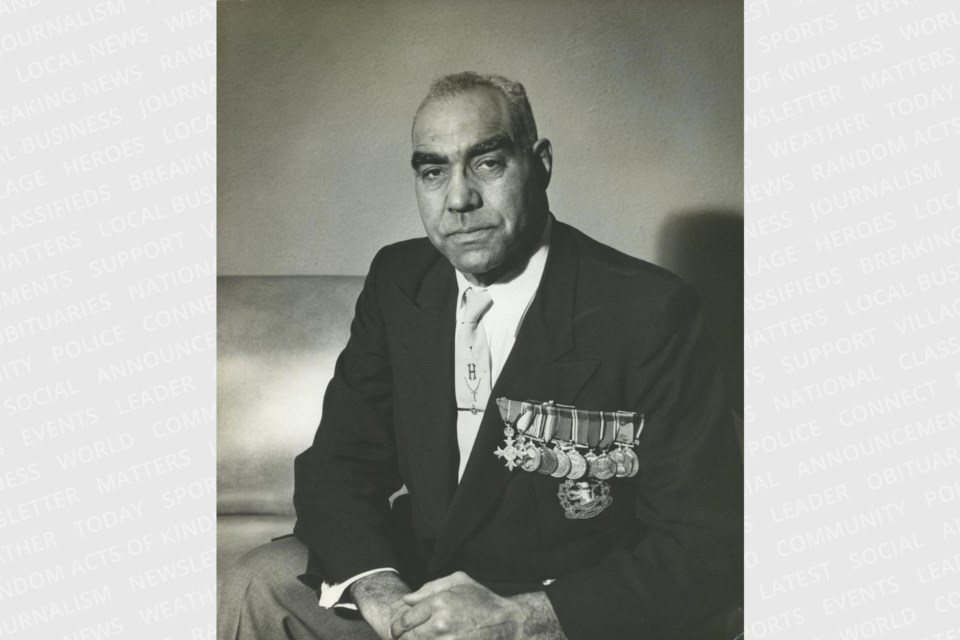Visitors driving through the sleepy little neighbourhood near Chapel Street and Dayfoot Drive in Georgetown have likely come across Henry Thomas Shepherd MBE Park.
Some may have looked at the initials MBE (Member of the Order of the British Empire) and concluded the name was important. But those who look deeper will find the story of a man with a remarkable life who beat seemingly insurmountable odds.
"Henry Shepherd was different than his neighbours because he was the grandchild of an escaped slave who settled in Stewarttown. He would have grown up being one of the very few Black people in this area and doubtless faced racism to some degree," local historian Mark Rowe told HaltonHillsToday.
The Canada of his time was actively hostile to African Canadians like him, but Shepherd still cut a niche for himself in public life and earned much respect from his peers.

"He served as a volunteer firefighter, eventually being named chief. He served in World War One, was wounded and eventually awarded the MBE by the King," said Rowe.
"He was a member of the Lorne Scots and helped found the Georgetown Legion. Henry Shepherd was not only involved in his community, he was a leader in his community. His colour never seemed to have been an impediment to his success."
Escaped slave John Henry Shepherd - Henry Thomas' father - arrived with his mother sometime in the 1850s. They made a home for themselves in what's now the Georgetown Fairgrounds.
But in 1871, when John Henry was 12, his mother died. She had arranged for a Colonel Murray - for whom she kept house at his 15 Sideroad home - to adopt her son if anything happened to her. He kept his word. The Murrays raised him like their own.
In 1886, Sarah Hartley arrived to work at the Murray Farm. She was a British 'home child' - girls and boys who were sent to work in British Empire colonies. A romance blossomed between her and John Henry Shepherd. They eventually were married. They had six children, including Henry Thomas Shepherd.
Before his military career began, Henry Thomas Shepherd had been a bus driver, a farmhand and a worker at Provincial Paper, near where the Georgetown GO station is now. He joined the army in 1911 and was soon shipped out to Europe to serve in the First World War.
There, he was one of 23 Black troops to see combat at the Battle of Vimy Ridge. He was wounded twice during his service in the war. The Georgetown Herald reported that he was recovering in hospital in 1918. With the war at an end, he returned to his job at the coated paper mill. He married Maude Cox in 1923.

When he made history as a founding member of the Royal Canadian Legion in Georgetown, he spent so much time there that it annoyed his wife. Such was his dedication to the institution he helped found, Maude once threatened to “send his bed down to the Legion hall.”
He stayed in the army’s orbit during the interwar period. He also gave his time to the local volunteer fire department, eventually making him chief.
When the Second World War began, Shepherd re-enlisted. His wounds from the first war made him ineligible for overseas service, but he was transferred to Toronto and Newmarket to train troops.
In 1944, he received his MBE from Ontario’s Lt.-Gov Albert Matthews at a ceremony in Toronto.
“One of the finest men to don the King’s uniform,” Capt. M.B. Collier of the Toronto Scottish Regiment told the Globe and Mail during this time period. “One of the ablest soldiers on the field,” read the same article.
Near the end of the war, he was named deputy fire marshal of Ontario military camps and was stationed at the Montieth prisoner of war camp.
Not much is written about his postwar life. He was known to be an active member of the community just like in the past. He didn’t see himself as extraordinary, even though certain events in his life challenged that notion. He raised his seven children to be humble and steadfast.
Henry Thomas Shepherd died in 1960 in Toronto’s Sunnybrook Hospital.
For further details, visit the Halton Hills Public Library website.



